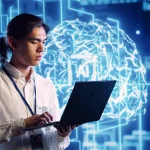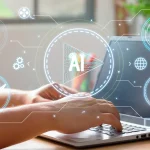The Impact of AI on the Job Market: Preparing for the Future

Artificial intelligence is now taking over most industries around the world and changing the future of work in amazing ways that no person could have ever fathomed. While AI continues to improve, the technology offers a number of opportunities and challenges for the workforce. Individuals and businesses alike are having to adapt to new job roles, new skills required, and a different environment of work. It is now time to take a closer look at how AI influences job employment and how workers can prepare themselves for a future controlled by AI.
How AI Is Shaping the Job Market
AI is furthering productivity, automating repetitive tasks, and making processes more efficient in industries. Artificial intelligence has brought about changes to manufacturing, health, retail, and financial services that allow for streamlined operations, reduced costs, and higher output. This also comes with the challenge of shifting job roles and skill requirements in these advancements.
Displacing and Creating Jobs
The fear of losing jobs is one of the major fears that lie with regard to AI. Many routine tasks, such as data entry, customer service, and operations on the assembly line, can be completely automated with the use of AI and therefore reduce the demand for labor in these aspects. Meanwhile, AI continues to create new jobs in emergent fields such as data science, AI engineering, and digital transformation consulting.
Many effects of AI within the labor market very often follow this pattern:
- Automation of Routine Tasks: AI automates low-skill and repetitive tasks, causing job displacement in manufacturing and data processing, among other areas.
- Augmentation of Human Roles: AI enhances the design of the job through building up the role of human workers to do their jobs faster and with more insight from data-driven decision-making. Examples include AI tools that support diagnostics by doctors and forecast financial trends by financial analysts.
- New Professions: As AI grows, new professions begin to come into being, such as AI ethics consultants, machine learning engineers, and data analysts who support, maintain, and further develop AI systems.
Key Sectors Affected by AI
The transformative power of AI into different sectors takes many varying shapes, but some key sectors are impacted more broadly than others:
- Manufacturing sector: Artificial intelligence robotics and automation are basically developing production through displacement of traditional jobs undertaken by human labor while creating new jobs in robotics maintenance and management of the AI system.
- Healthcare: AI assists healthcare in diagnosis, monitoring of patients, and treatment recommendations. Newer roles that arise are in telemedicine, data analysis, and integration of AI in healthcare.
- Retail: AI-driven innovations enhance customer experiences through personalized recommendations, inventory management, and cashier-less checkout. While some functions become automated, others create employment opportunities involving customer interaction and e-services.
- Finance: AI algorithms process large volumes of information to make speedy decisions over investments, fraud detection, and risk assessment. This creates greater opportunities for specialists in AI systems and cybersecurity.
While some jobs are taken over, new ones are created, and skills in those industries change, which nudges workers toward upskilling and reskilling opportunities.
Skills of the Future: Adapting to an AI-Driven Job Market
With AI reworking job descriptions, the workers need to adapt by acquiring those skills that have worth in an AI-enhanced work environment. Here go some key skills to stay relevant in the AI-dominated world:
- Digital Literacy: The concept of digital literacy includes knowledge and use of digital tools, management of data, and basics of AI across industries. Knowledge regarding the usage of AI applications, data analysis, and software shall constitute better employability and adaptability.
- Data Analysis: AI requires huge amounts of data to work out; hence, related competencies in data analysis and data literacy are in demand. Those employees who can make sense of data, analyze, and then act upon such insights are most likely to succeed in the future job market.
- Problem-solving and Critical Thinking: AI systems are instructional tools. Human intervention through workers who solve problems and think critically is, therefore, relevant to instructing AI applications, recognizing limitations, and improving outputs.
- Creativity and Innovation: AI can only perform pattern-based work; it is not truly creative. Innovation-based jobs, ideation, and design thinking are, therefore, less likely to be automated and hence in demand.
- Emotional Intelligence and Interpersonal Skills: Functions requiring empathy, emotional intelligence, and interaction with human beings cover occupation areas that can never be fully emulated by AI-from teaching through healthcare to counseling.
Workers prepared with these skills will be ready for the AI job market effects and are able to adapt to changing work environments with resilience and agility.
How Companies Are Preparing for an AI-Driven Workforce
Organizations, in turn, have also begun to feel this need for adaptation to AI and the preparation of their workforce in facing the challenges ahead. Companies can invest in talent development, reskilling, and integration of AI to play to their full potential in managing the impact AI will have on the job market.
1. Investment in Employee Upskilling and Reskilling
Many companies are investing in training programs that would ready their staff for the future. Upskilling can be described as amplifying the skill sets of a particular employee, while reskilling does mean training an employee in such a way that he or she may switch to a completely new role. This way, employees benefit from this-that instead of being replaced by the AI systems, they can develop in the corporation.
2. Collaborate with AI
The feeling of AI as a complementary tool, rather than a replacement, has become common in many industries. Companies are therefore using AI to extend human jobs by merging the creative and critical thinking capabilities of humans with the efficiency and data processing capabilities of AI. Doctors use AI for diagnosis in healthcare, while in marketing, AI analyzes consumer data to help marketers create targeted campaigns.
3. Creation of New Jobs and Teams
Similarly, with evolving AI technologies, there are positions being created by businesses to manage the operation and optimization of these systems. Jobs such as AI ethics officers, automation strategists, and data governance experts ensure the execution of AI aligns with ethical guidelines and company objectives. It is through defining such roles that companies proactively address the challenges of AI in building a future-ready workforce.
4. Emphasizing AI Ethics and Responsible AI Use
Ethics, of course, further drive many considerations, particularly with the use of AI, privacy, equity, and bias. A number of companies today claim that their top agenda is to develop responsible AI, hence the need for the development of AI ethics and compliance positions to keep these systems at bay responsibly. This would reassure employees and customers that the AI has been developed ethically, a situation that brings about trust and transparency of information.
Getting Ready for the Future of Work
Workers may say that they will be ready for whatever changes AI does to the labor market, but one can never know. In adapting to it, it is going to take a lot of stamina on the part of the workers. While preparing for an AI-driven future, here are some actionable steps that one may consider:
- Continued Education: The regular updating of your skills through courses, certifications, and training programs has become key to success. There are quite a few online learning platforms where individuals can pick up the skills related to data analysis, AI basics, or programming.
- Practice lifelong learning: Technology involving AI is rapidly changing, and just to keep up with this evolution, there is a very important attribute for the people of the 21st century-commitment to lifelong learning. Undertake fresh challenges, attend industry conferences, and be very curious about what’s next in AI.
- Networking and collaboration: Establish a network among your peers and professionals, along with you struggling through the impact of AI in your current field. This will provide support, insight, and further leads on job opportunities in an evolving job market.
- Seek Growth Opportunities Within Your Organization: If your organization is adopting AI, seek out growth opportunities and express interest in relevant training programs or projects. This can help you get experience and further your career.
- AI Literacy: While not everyone needs to be an expert in AI, basic knowledge of AI and its applications would surely add value to a career. Learning about what AI is doing to your industry and being able to recognize the capabilities of AI will help you stay competitive and knowledgeable about it.
The Future of Work with AI: Embracing Change
With AI taking over routine work, there are definitely positive impacts on the labor market in terms of growth, innovation, and productivity. In support of this, as AI takes over the host of repetitive tasks, workers are freed to work on more creative, strategic, and human-centric roles. The rise of automation will indeed lead to lost jobs in sectors but simultaneously evoke new ones, which require a set of unique skills-a mix of technology, empathy, and innovation.
Skill development with a proactive mindset and a flexible attitude is what will help the working population excel in their field when AI becomes an integrated core. Companies, too, must play their role in training and investing in ethics in AI to maintain equilibrium in technology adaption.
The future of work with AI is promising yet simultaneously transformative. Preparation today helps ensure a career that will flourish tomorrow in a world where the powerful synergy between AI and human potential shapes the next era of the job market.
Conclusion
The core, however, is learning, collaboration, and embracing new roles and technologies as we adapt to the influence of AI. We can co-create a more innovative, inclusive, and prosperous future of work for all.
Read also: How Practicing Mindfulness Can Enhance Your Physical and Mental Well-being











